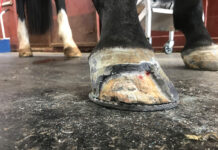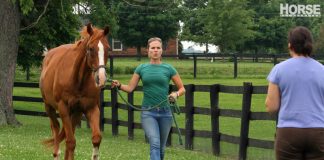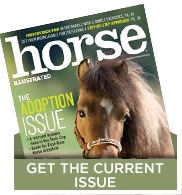There are only a few diseases that I really hate. Lymphosarcoma is one of them. This disease is a cancer of the lymph tissue. Thankfully horses don’t get cancer often, but when they do it’s usually deadly and it’s usually this disease.
In the case of lymphosarcoma, the lymph tissue becomes cancerous, often starting with one lymph node and spreading to others. The lymphatic system is the body’s defense network and lymph nodes are small nodules throughout the body that filter lymph, destroy infections, and produce white blood cells. People often refer to these nodes as “glands.” Along with the lymph nodes, there is also lymph tissue that is diffusely spread throughout organs such as the intestines and the skin. Any one of these “glands” or lymph tissue can become cancers, hence the symptoms of the disease can vary greatly depending on the location of the cancerous tissue. There are four general types of lymphosarcomas which are categorized on location. The four main types are generalized (multi-centric), intestinal, mediastinal and cutaneous.
The generalized form is the most common and includes multiple peripheral and internal lymph nodes. Basically, it is tumors through the lymph nodes of the body. Common sites are the nodes (glands) around the throatlatch, in between the jaw, at the base of the neck, superficial inguinal, mesenteric, and the pectoral region. The most common clinical sign of this type of lymphosarcoma is large masses on the chest, at the base of the neck, under the jaw, and at the throatlatch. Ventral edema is very common as well as weight loss. Sometimes the diffuse lymph tissue within the skin can also be affected which manifests itself as a severe ulcerative dermatitis, where the skin literally erupts with crusting sores that don’t heal. This form also has the lowest survival rates, often only weeks to a few months.
Intestinal lymphoma involves the diffuse tissue within the intestinal wall. Involvement in this area causes malabsorption problems of the intestines. This leads to severe weight loss, diarrhea and sometimes colic. Mediastinal refers to the lymph nodes within the chest in between the lungs. Tumors in this region can cause coughing, increased heart rates, fluid on the chest and even fluid within the chest.
The best and least deadly form of this disease is the cutaneous form which, is lymph nodes that turn into tumors under the skin and don’t migrate throughout the body. Horses with these types of tumors typically do very well and live fairly long with minor clinical symptoms.
Unfortunately, if large tumors are not visible, diagnosis can be difficult. There is also overlap of the different types, which leads to further diagnostic challenges. A biopsy of the tumor can confirm the diagnosis, but can sometimes introduce tumor cells into the blood stream which could cause the cancer to spread further. An ultrasound of the tumor is typically very characteristic and diagnostic. Often a diagnosis is made from clinical signs such as weight loss, masses, depression, edema of belly and legs, fever, diarrhea, skin crusting and scaling, coughing, high heart rate, blood changes such as anemia and a variety of other symptoms caused by the tumors that affect the tissue they are close to.
Treatment is also difficult; many horses don’t survive longer than a few weeks or months. Chemotherapy has been proposed, but often financial constraints and side effects severely limit their use. Some herbal remedies have been helpful for those horses with a less aggressive disease. Corticosteriods have been shown to be helpful but high levels are often needed and secondary laminitis has been documented. Interestingly, some tumors have progesterone receptors and sometimes pregnancy can reduce or eliminate some cutaneous tumors, but the use of progesterone for treatment is not widely accepted.
 Dr. Posnikoff has been a longtime contributor to Horse Illustrated. She currently heads her own practice, Orange County Equine Veterinary Services, in Orange County, Calif.
Dr. Posnikoff has been a longtime contributor to Horse Illustrated. She currently heads her own practice, Orange County Equine Veterinary Services, in Orange County, Calif.
Other articles by Dr. Posnikoff:
The Truth About Ringbone >>
Tendon and Ligament Injuries >>
Colic Surgery Guide >>
Advances Against Cushing’s Disease >>






I do like the article, and it is helping me with how to understand exactly what happened to my dear friend, Amir, my arabian who past away recently.
thank you
My 9yr old perchX was just diagnosed with cancer at Tufts University here in Massachusetts. He has a mass that had formed over the last 5-6 weeks over his right abdomen at the level of his last rib. He also has a history of episodes of blood in his urine and fever which has been occurring for the past three years.
I’m looking for more information on equine cancer and how I can keep him comfortable and happy. I would be happy to share his discharge report to help. I can be contacted at the e-mail address below.
Scoburn11@hotmail.com
Just got the diagnosis of an external abdominal tumor from 3 seperate labs. It is Lymphosarcoma and he is very healthy with good blood work results. I’m not going to take this laying down. My family are all human physicians at Mayo and Cleveland Clinic. We are first going to give him antiviral(aka Valtrex etc) orally for 5 days, then 2600 mg of Cimetdine (the fix for Grey horse Melanoma) to ramp up his immune system, then a Cowpox vacination, 2 weeks human Pappiloma virus series(you know the one for the young girls for cerival cancer), then the shot used for Sarcoma’s . All the shots will be spread apart by at least 2 weeks. This is a herpes related cancer. I’m going to fight this with all my heart and soul. None of the treatments will harm him and if there are any reactions I’ll stop. I have a heathy horse right now. I have been assured by the vets that what I am doing should be safe and makes great sense.
What a horrible disease. I never knew anything about it before
just got the news, our beloved horse has cancer. I am lost for words since our 13 year old daughter just passed away this Oct. I am not sure what to think at this moment but, I am thankful for any and all information I can find on this matter. Hug’s Paula
Our horse had a tumor removed from her lower eyelid recently. After 4 different biopsies of the tissue (at 2 different labs), the tests came back 50/50 as to whether it was encapsulated lymphoma or systemic lymphoma. Thank you for this article…..
Our horse was diagnosed 4 years ago with lymphosarcoma when she was a 7 year old. The vet did a biopsy of the small lumps that had developed on her chest. At this time our vet said they weren’t in her lungs which was a good thing. The vet gave her 7 months to 2 years to live and we put her on steriods. Within months she had lost weight and the lumps had increased to golf-ball size all over her bilaterally on her lymph nodes. We had some friends recommend natural antioxidants and one was Himalayan Goji juice (now Gochi). Sandy Moreland of Freelife, Inc. donated 20 cases of Goji juice to our horse, Gracie and she made a dramatic recovery. All the lumps went away except for one on her chest before we ran out of the Goji and stopped giving it to her. She has been off it for about a year now and has started having nosebleeds from one nostril. We were told by the vet that this would be an indication that the cancer had spread to her lung(s).
My horse has cancer. It is a growth around his genitol area. At first it was just a small size ball. I thought he had a ball but he is gelded. It has grown to the size of a foot ball. It has what I call fingers growning and crusting over. I am heart broken and don’t know what to do to make him comfortable.
i have a friend who own a litte 4 year old paint mare i have seen her grow up and amreally concern about her…just recently she has gotten a massive hard lump on her neck and around this lump is a bunch of little ones which lead over her crest and a little on the other side…i am hoping to get some advice and see if anyone has an idea of what this is im hoping it isnt cancer but well if it it we all know what has to happen 🙁
I have a 30 plus year old gelding that had lymphoma over ten years ago. This diagnosis was verified by bloodwork tested at two different University vet schools. With a grim prognosis, I decided to experiment with a herbal remedy; he went into remission for several years. Within the past year he has had recurring bouts of diarrhea and chronic sinus problems. After rounds of antibiotics, my vet thinks our next step would be to scope him. At this point, I will again try the herbal remedy as he still has a robust appetite and good attitude.
What is the herbal remedy you used for your horse’s cancer?
I just found out today my 26 year old Arabian gelding has lymphoma. He doesn’t seem to be in any pain and I’m really hoping to at least get him through the summer. It’s heart breaking, I love him so much! I’ve cried like a baby for two days straight. But Tuesday we should know for sure if I can try to get him through the summer or if it looks like I’ll have to put him down sooner then that. I’m preparing for the worst but praying like a mad woman for the best. : (
I have a 11yr old chestnut gueilding that was just dignosed with lymphoma cancer. I have a 14yr old daughter and a 8 yr old that are going to be crushed when i tell them that jack is sick. He was my horse first then Courtneys, then Kaileas. He is like one of my own kids and my best friend.
My 18 year old gelding passed today of this terrible cancer. Three months longer than we expected. He was my beautiful boy. The past week it took him quickly. My vet said he was glad I was able to have a little more time with him then putting him down when we found our.
My 18 year old gelding passed today of this terrible cancer. Three months longer than we expected. He was my beautiful boy. The past week it took him quickly. My vet said he was glad I was able to have a little more time with him then putting him down when we found out.
I just had to put down my beautiful palamino quarter horse due to what is believed to be this disease. He developed a mass on his cheek and throat latch are over a short period of time and in a matter of weeks had grown to the size of a cantalope. It started to interfere with his eating and he lost weight rapidly. We had no other choice but to put him to sleep. I am heartbroken and miss by beautiful boy.
Tomorrow I bring my 19 year old arabian home, my endurance horse, the horse I taught my kids to ride on. Smarter than me by furlongs. We will keep him comfortable and he will get to be with his girls. His tumor is prominent and on the right side of his muzzle, close to the bone. Doc says excision will just leave a hole on the side of his face and that there are to many blood vessels at the tumor site. Has anyone ever done a partial excision and cauterization to try to give, at least, a better quality of life? My buddy needs me, so I am asking for suggestions, if anyone has a recommendation, please respond.
@victor. my horse developed a tumor on the inside of her left hind leg. it grew to be the size of an egg in 2 weeks. the vet removed it and sent it for a biopsy. it’s lymphoma. like yours, it was around many veins and vascularity. he got out the majority of it but new almost immediately what it was when he saw the huge vein running through it.
such a rare disease in horses. and such a shame that my barrel mare at just 6 years old is going to have to face this. she is my baby. best horse i’ve ever had.
My horse has just been diagnosed with Lymphoma and it has been confirmed today that it is multicentric. He has it in his heart, most likely in his gut as only absorbing 25% of his food. He has lost tail and anal tone. It is very distressing. I have found yiur article very factual and helpful and have referred to it several times whilst awaiting is diagnostic test results. Sadly costs prohibited me treating with chemo howver we will be looking at streoids for him. Any further observations would be helpful from anyone who has had a horse with this awlful illness.
There is a new organization with a support system for horses with all types of equine cancer. The Equine Cancer Society is a non-profit organization built to educate horse owners on equine cancer as well as helps to raise funds for equine cancer research. Their website is http://www.equinecancersociety.com